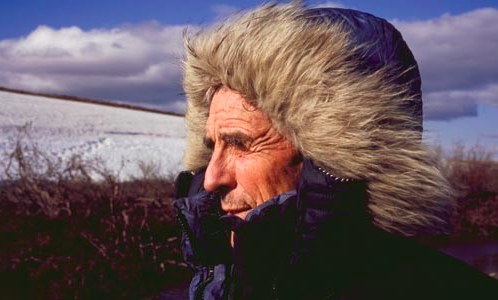
The letter below, sent on Earth Day eve to email subscribers of the Peter Matthiessen Center project, was written in the context of the campaign to establish a writers’ and environmentalists’ retreat at the late author’s former home in Sagaponack, NY. Currently, the project’s organizers are trying to raise money to acquire the property, located at the corner of Sagg Main and Bridge Lane, restore the historic buildings and reestablish the site’s famously beautiful gardens—a blend of cultivated, wild and native habitats—as well as the “Zendo” (meditation place) the writer created as a senior monk in the early 1980s.
As the pandemic has slowed modern life to an isolated crawl, nature is reclaiming our world. Once polluted city skies are blue, rivers are clear, and birds and other species, in apparent solidarity with their human counterparts, are beginning to nest. We hope this finds you and your loved ones safe and healthy as we collectively adjust to this global reset.
A naturalist and writer who dedicated much of his six-decade career to giving a voice to the voiceless, among both animals and humans, Peter Matthiessen believed in a world where environmental and human rights coexist. In his 1959 classic, Wildlife in America, Peter highlighted the systematic destruction of the American wilderness, along with the effective slaughter of millions of birds and other fauna. In prose luminous and poetic, Peter fearlessly exposed the true price of our “American progress,” painting an American landscape largely shorn of what once made it so majestic – wilderness. Along the way, he edifies his readers with little known yet remarkable facts about our natural heritage: the extinction of an American parrot (the Carolina parakeet), nomadic buffalo herds that roamed the East Coast, and forests so deep and extensive that squirrels could travel from the Atlantic to the Mississippi without touching the ground.
Alongside Silent Spring, published three years later by one of his heroes, Rachel Carson, Wildlife in America was a seminal book that helped give rise to the modern environmental movement that took root just a few years later, in the mid-1960s. That commitment to exposing the truth and ugliness of progress was a recurring theme of his many articles and books—whether fiction or non-fiction—as were the issues of economic and social injustice that so often accompany environmental destruction. He was particularly concerned about the brutal mistreatment of native peoples (In the Spirit of Crazy Horse, Indian Country, At Play in the Fields of the Lord) and migrant farm workers (Sal Si Puedes). He also wrote about the plight of the Bonackers of Eastern Long Island, working class Americans whose livelihoods as commercial fishermen and local farmers were made, and lost, along with centuries-old traditions and practices, to the wave of development that became “The Hamptons” (Men’s Lives).
In honor of Earth Day, we include here a talk Peter gave in 2012 at Cornell University, entitled, “Big Oil and Our First Climate Change Refugees.” It was part of Cornell’s Iscol Environmental Lecture series, which features prominent thinkers discussing vital environmental issues facing our planet. In this one, Peter chronicles his experience and observations writing about climate change over the course of his life, with a focus on the drilling of the Arctic and the negative consequences it has had, not only for the landscape and wildlife, but the indigenous people who call this region home.

We need support that enables us to continue staffing the effort and building momentum. Our first appeal to raise the initial $95,000 needed to become operational was very successful—we raised nearly $90K thanks to our subscribers!
Now, six months hence, we are asking for your help again, notwithstanding the other worthy requests that are undoubtedly coming your way. Please consider making a tax-deductible, charitable donation to the Peter Matthiessen Center. Please also help us spread the word to friends and family who you think share an interest in writing, environmental conservation or Zen practice but may not be familiar with the initiative.
Thank you,
Alex Matthiessen and Daniela Kronemeyer
If you would like to make a contribution to our campaign, please do so online by clicking here or writing a check to the Peconic Land Trust at the address below. (Please be sure to include “Peter Matthiessen Center” on the memo line for all donations.)
Peconic Land Trust
Attn: Kim Quarty
296 Hampton Road
Southampton, NY 11968
Many thanks for your continued support!
————
P.S. Please also visit our brand new Peter Matthiessen Center website where you will find more information, including a way to sign up for our periodic email updates. On the site, you will find the fascinating story, blog-posted by Preservation Long Island, of the Matthiessen property dating back to 1900 as well as links to Jeff Sewald’s documentary film on Peter, No Boundaries. Soon visitors to the site will receive progress reports and notices on upcoming Zoom-based outreach events as well as suggestions for how to get involved.





